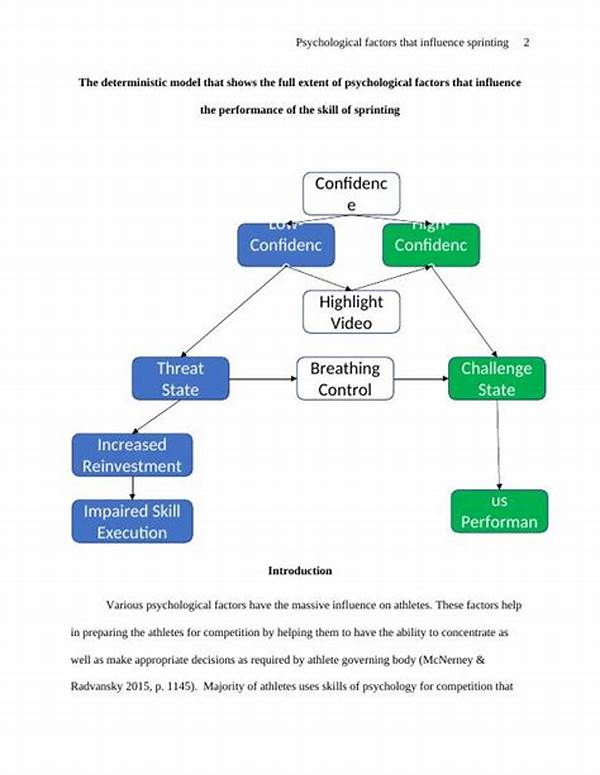The Role Of Psychology In Sprinting

Imagine being at the starting line of a major sprinting event, the crowd buzzing with anticipation. The tension is palpable, and every millisecond counts. While physical prowess is critical, the real magic often happens in the sprinter’s mind. Athletes are not just defined by their muscles and speed, but also by their mental fortitude. Psychological elements can make or break a performance in sprinting, transforming an average sprinter into a world record breaker.
Read More : Jd Sports Launches Sneakers In Collaboration With International Artists In 2025
The fascinating intertwining of psychology and sprinting is both overlooked and underestimated. Just as a car cannot run without fuel, a sprinter cannot succeed without the right mindset. This article will unravel the mystique surrounding the role of psychology in sprinting, revealing essential insights that may change how you perceive sports altogether. Whether you’re a seasoned athlete, an amateur runner, or someone who just loves the thrill of the race, understanding the psychological elements can be the game-changer you need.
Understanding the Mental Game in Sprinting
When it comes to sprinting, everything happens in a matter of seconds. The sprinter must rely not only on their honed physical skills but also on their sharp mental acuity and resilience. The role of psychology in sprinting is a sophisticated dance of focus, determination, and the ability to remain calm under pressure. Elite sprinters like Usain Bolt have consistently highlighted how their mental strength as much as their physical training contributed to their success.
The Power of Visualization
One crucial psychological technique many sprinters use is visualization. This involves mentally practicing the race before actually performing it, which primes the mind and body for the task ahead. Visualization can help sprinters anticipate how the race will unfold, allowing them to prepare mentally for every possible scenario.
Moreover, research indicates that visualization activates the same brain regions that are used when actually performing the physical task. This means that mental practice can be nearly as effective as physical practice, offering a clear edge to the athletes who use it. For anyone looking to improve their sprinting, embracing the art of visualization can be a powerful tool in their arsenal.
Coping with Performance Anxiety
Performance anxiety is a natural part of competitive sports. The key is managing this anxiety to ensure it doesn’t derail performance. Techniques such as deep breathing, positive self-talk, and mindfulness can help in managing stress levels. Sprinters often cultivate a routine that includes these techniques to maintain their mental equilibrium before a race.
Michael Johnson, a legendary sprinter, once said, “Pressure is nothing more than the shadow of great opportunity.” This perspective highlights how the role of psychology in sprinting is about finding the right balance and using pressure as a motivation rather than a deterrent.
Building Resilience and Mental Toughness
Sprinting demands not just physical stamina but also immense mental resilience. Sprinters face countless challenges—from setbacks, injuries, to fierce competition—and bouncing back from these hurdles is essential. Developing mental toughness gives sprinters the ability to keep pushing forward despite the obstacles they encounter.
Specific Techniques to Enhance Mental Performance
Understanding the role of psychology in sprinting leads to adopting specific strategies tailored to enhance mental performance. Coaches and athletes can work together to optimize the mental game through specialized techniques.
The Role of Psychology in Competitive Advantage
Integrating psychological training can be the deciding factor in a sprinter’s success. When physical capabilities are matched, mental fortitude can be the tie-breaker. A focus on psychology complements the physical training, filling gaps that pure physical training might leave exposed.
Read More : Benefits Of Roller Skating
Sprinters with a keen understanding of psychological principles are more agile in handling adversity, adjusting strategies, and staying motivated. The sprinter’s ability to visualize success, manage stress, and maintain focus are features that contribute significantly to a competitive edge.
The Overall Impact of Psychology on Sprinting
When examining the role of psychology in sprinting, one cannot dismiss its profound impact on performance and satisfaction in the sport. Psychological elements fuel the passion for sprinting, enabling athletes to reach peak performance both on and off the track.
Benefits Beyond the Track
The psychological skills developed through sprinting are transferable to other areas of life. The resilience and discipline nurtured in sports can aid in personal and professional growth, contributing to a well-rounded individual.
Growing Research and Expertise
The body of research on psychology in sports is expanding, providing valuable insights that continue to refine training methods. Sports psychologists play a crucial role in this domain, offering their expertise to athletes aiming for the top.
Conclusion: Harnessing the Power of the Mind in Sprinting
In summary, the role of psychology in sprinting cannot be overstated. Sprinting is not just a physical battle, but a mental one as well. Athletes who prioritize their mental training stand to benefit not only in their performance but in their overall sporting experience.
The interplay of psychology and sprinting reveals that mental preparation is as vital as physical training. By understanding and leveraging the power of the mind, sprinters can turn their potential into tangible achievement. As the field of sports psychology grows, the future of sprinting will increasingly hinge on mastering not just the track but the mental terrain.
The next time you watch a sprint race, remember that what you’re witnessing is not just a contest of speed—it’s a testament to the incredible power of the human mind.



